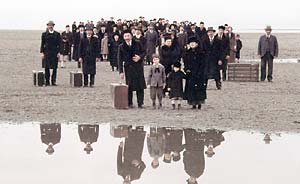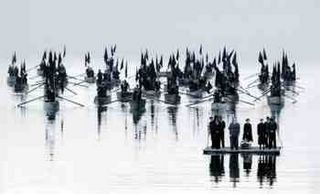
Weeping Meadow: opening sequence
Last night to FACT for the first part of Angelopoulos' planned Trilogy - and what a masterpiece! Possibly greater than the Travelling Players. Sheer visual poetry.
In 1919, Greek refugees from Odessa arrive in Greece, among them Spyros; his wife, Danae (Thalia Argyriou); their son; and a younger orphan girl called Eleni. They are given land beside a river and build a village. Some years later, Spyros is prospering but Eleni, who has become pregnant by Spyros’ son, returns after a secret birth. Her twin babies, Yorgis and Yannis, have been adopted. When Danae dies shortly afterwards, Spyros becomes obsessed with Eleni and a marriage is arranged. But Eleni flees the ceremony with Spyros’ son and, with the help of travelling musicians led by violinist Nikos, they flee to Thessaloniki.
That's the story: but it's the way it is told which is pure magic.

Weeping Meadow: the funeral flotilla
Angelopoulos on his films and Greek Myth (from Artificial Eye pack):
I do not believe that my films are pessimistic. There may be a slight sense of melancholy, but I would never characterize it as pessimism. On the other hand, I dislike the words pessimism and optimism. I try to see clearly. My generation, and all those who lived through the adventure called post-war history and hope for a new world, witnessed a series of disappointments. The changes that came to the world brought no results, nor opened the way as we had expected. Our feeling of melancholy is the dignity of the heart facing the defeat of a vision...
I do not know why, this is my personal view of the world. Even in my owncountry I feel like an exile. I find myself in a kind of internal exile. I have not yet found my home, and by that I mean a place where I am in harmony with me and myself, with myself and the world. My temporary home may be sitting next to someone driving a car with the landscape fleeing behind the windowpane. I feel that I find there a lost sense of balance. It is the only home that accepts me and that I accept... The past is not past. This triple dimension of time, past, present, future, for me does not really exist. The past is only past in time; in reality, in our consciousness, the past is present, and that which we call future is nothing else than the dreamlike dimension of tomorrow experienced in the present...
Music in my films does not accompany the narrative musically. It is a dramaturgical element, it narrates, it participates, it is an integral part of the films' text. Without it, there would be a lack of something essential. In this sense music is an actor in the movie, a living element. In most of my films, the music belongs to someone, emerges from someone, constitutes his obsession. Sometimes dreamlike, sometimes a broken voice, sometimes fragmented speech, sometimes a symphony, sometimes an expression, sometimes the pursuit of the unsaid. The composer sits at the piano, we work together, we listen, we make changes, we change tone and range, I stop her while she improvises, I single out musical phrases that she then reworks into a finished melody. Musical instruments are introduced. The musical landscape is fragmented in order to be pieced together again and transformed, in this way, into the final result...
Often in my films, there is rain, mist, winter, snow, a pact with winter. Why? I couldn't say why. What I can say though is that the landscape you see is not an external one, it is an internal landscape, most of the mist is created by me, most of the rain is artificial rain, the snow is mostly artificial snow, the colors of the houses are recreated, and the choice of locations does not correspond to a particular geography, it reflects internal landscapes.
Greek myths, Greek mythology is a history we learn at school, we live with it; it has influenced our daily life. Greece is a country full of ancient stones, ancient temples in ruins, lost civilizations, that left in their wake texts and broken stones. This is something we discovered as soon as we opened our eyes, at our first moment of awareness, something that we grew up with. We have learned to love ancient stones, and the myths through which our personal history has passed, continues to pass and to be filtered...
In what concerns my age and experience, I have emerged from a period of Greek history that included the 2nd World War and the ideological conflicts of my generation. I have inevitably been influenced by all this. Historical events are not detached from us, they are inside us, they determine, influence, shape our life, our way of thought, our perspective. How do I feel in Greece? Strange. At times very close to her, but to a Greece of my own, an internal Greece that probably does not exist, but it is this Greece that often reconciles me with modern Greece, which wounds me to an unimaginable degree...
I consider myself a thinking individual, and since the problems of mankind remain the same since the creation of the world, and the questions of mankind are the same and still remain unanswered, I believe that all the questions, thoughts, and the philosophical view of the world present in my films, are nothing more than a repetitive reinstatement of these age-old questions about eros, death, birth, dreams, the perspective of a better world, youth and old age, love.. . La condition humaine, the fate of man.
I would like the world to remember my work as a musical moment, as a musical phrase, suspended, that may reach some people. The important thing in my life is what I do, my work, what I see, feel, what I dream of. At this moment all my thoughts are reflections in a mirror. At some point, tomorrow, or the day after, when shadows will acquire an outline, when the tear
becomes a river, another story may be born, yet another story of mankind...
Speaking about me once Tonino Guerra said that I am a valley that sheds little teardrops on the grass, that join together and become water, a stream that flows away to join the great river.
December of '44, the civil war broke out. My family divided into two factions, some siding with the leftists and the others, like my father, an old liberal, with the old order of things. The battle of Athens. 33 days. A battle that turned into a slaughter. My father tried to maintain a neutral stance, one that was almost critical of both sides. But in vain. He was arrested by the leftist rebels led by my cousin and taken outside the city to be executed. For days my mother and I searched for his body among the hundreds of others lying scattered about in muddy fields and abandoned building sites. I can still feel her trembling hand in mine. With the defeat and retreat of the Democratic Army, the army of the rebels, towards northern Greece, we learned that they had taken him with them as a hostage like hundreds of others. In my days here in Greece Homer and the ancient tragic poets constituted part of the school curriculum. The ancient myths inhabit us and we inhabit them. We live in a land full of memories, ancient stones and broken statues. All contemporary Greek art bears the marks of this
coexistence.
It would be impossible for the path I have followed, the course I have taken, for my thinking not to have been infused by all this. As the poet says "they emerged from the dream, as I entered the dream. So our lives were joined together and it will be very difficult to part them again."
1 comment:
If you are alone, call this number 800-211-9293. Connect with Real Singles from your local area instantly for only $0.99/min with a $4.99 connection fee. A true Match is only one phone call away 800-211-9293. Meet people with common interests and desires now. Check it out. 800-211-9293
Post a Comment